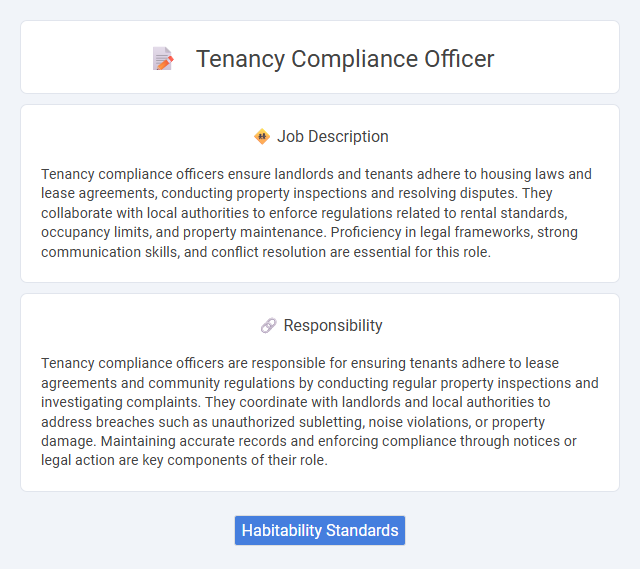
Tenancy compliance officers ensure landlords and tenants adhere to housing laws and lease agreements, conducting property inspections and resolving disputes. They collaborate with local authorities to enforce regulations related to rental standards, occupancy limits, and property maintenance. Proficiency in legal frameworks, strong communication skills, and conflict resolution are essential for this role.
Individuals who possess strong communication skills and an ability to enforce regulations with fairness might be suitable for a tenancy compliance officer role. Those comfortable working independently and handling conflict situations could probably excel in managing tenant disputes and ensuring adherence to tenancy agreements. Candidates who struggle with confrontation or have limited understanding of legal frameworks may find this job challenging.
Qualification
A Tenancy Compliance Officer typically requires a background in property management, housing law, or social services, often supported by relevant certifications such as a Housing or Lettings Qualification. Strong knowledge of tenancy agreements, landlord-tenant laws, and conflict resolution skills are essential to ensure adherence to housing regulations and tenant rights. Experience in conducting inspections, managing complaints, and maintaining detailed records also significantly enhances job performance in this role.
Responsibility
Tenancy compliance officers are responsible for ensuring tenants adhere to lease agreements and community regulations by conducting regular property inspections and investigating complaints. They coordinate with landlords and local authorities to address breaches such as unauthorized subletting, noise violations, or property damage. Maintaining accurate records and enforcing compliance through notices or legal action are key components of their role.
Benefit
A Tenancy Compliance Officer likely improves landlord-tenant relationships by ensuring adherence to housing laws and lease agreements, reducing disputes and potential legal costs. They probably enhance community stability through monitoring and enforcing tenancy conditions, which can lead to safer, well-maintained living environments. Employers may also benefit from risk mitigation and improved tenant satisfaction, ultimately supporting property value retention.
Challenge
A Tenancy Compliance Officer likely faces significant challenges in ensuring tenants adhere to lease agreements and housing regulations. The role probably demands managing conflicts, addressing violations, and balancing enforcement with tenant relations. Navigating complex legal frameworks and maintaining up-to-date knowledge on housing laws may also present ongoing difficulties.
Career Advancement
Tenancy compliance officers ensure adherence to housing policies and regulations, conducting property inspections and resolving tenant disputes. Proficiency in legal frameworks and strong communication skills open pathways to senior compliance roles, housing management, or regulatory consultancy. Continuous professional development and certifications in housing law significantly enhance career advancement opportunities in this sector.
Key Terms
Habitability Standards
A Tenancy Compliance Officer ensures rental properties meet established habitability standards, focusing on health, safety, and maintenance regulations to protect tenants' well-being. They conduct property inspections, document violations, and enforce local housing codes to guarantee safe living conditions. By collaborating with landlords and tenants, they facilitate timely repairs and legal compliance, reducing risks of tenancy disputes and unsafe housing environments.
 kuljobs.com
kuljobs.com